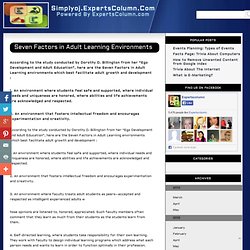

Tertiary Education (TQFE), Postgrad.Cert. - Part time online by University of Stirling, United Kingdom. Structure and content You will complete the following three modules: Learner Identity and Diversity: Increase student’s capacity to respond positively to diversity; to understand the importance of learner identity in student engagement in learning and to critically evaluate policies and practices to that end.
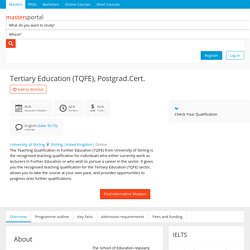
Students will critically evaluate evidence from the field of practice as well as research evidence.Teaching and Assessment: Provides a critical and reflective space for sharing and developing students’ knowledge, skills and awareness of the processes of teaching, facilitating and assessing learning in post-compulsory contexts.Professional Practice: Enables students to critically examine their role as a professional teacher in Further Education and to identify areas of their practice that could be changed to improve the learning experiences of their students.
Delivery and assessment Recommended reading Avis, J., Fisher, R., & Thompson, R. (2010). Instructional Technology and Distance Education, M.Sc. - Online by University Fernando Pessoa, Portugal. Programme Structure Courses Offered by University Fernando Pessoa(Portugal) (15 credits) Term 1.
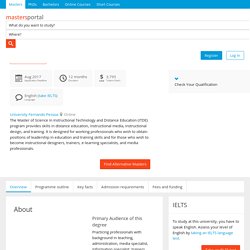
Growth Mindset and Motivation in EdTech – What You Need to Know. By Karen Mahon If you follow trends in education at all, then you know that "Growth Mindset" has been a big buzz term for the last several years.
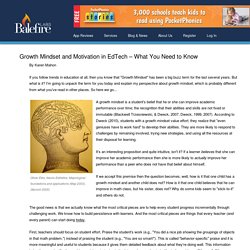
But what is it? I'm going to unpack the term for you today and explain my perspective about growth mindset, which is probably different from what you've read in other places. So here we go... Oliver Elbs, Neuro-Esthetics: Mapological foundations and applications (Map 2003), (Munich 2005) A growth mindset is a student's belief that he or she can improve academic performance over time; the recognition that their abilities and skills are not fixed or immutable (Blackwell Trzesniewski, & Dweck, 2007; Dweck, 1999, 2007). It's an interesting proposition and quite intuitive, isn't it? If we accept this premise then the question becomes, well, how is it that one child has a growth mindset and another child does not? First, teachers should focus on student effort.
Second, teach your students to use self-regulation strategies. Published January 29, 2016 O? 8 Important Characteristics Of Adult Learners. Adults are characterized by maturity, self-confidence, autonomy, solid decision-making, and are generally more practical, multi-tasking, purposeful, self-directed, experienced, and less open-minded and receptive to change.
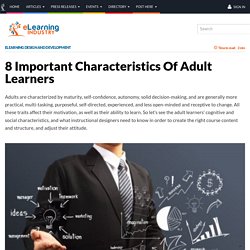
All these traits affect their motivation, as well as their ability to learn. So let’s see the adult learners' cognitive and social characteristics, and what instructional designers need to know in order to create the right course content and structure, and adjust their attitude. Self-directionAdults feel the need to take responsibility for their lives and decisions and this is why it’s important for them to have control over their learning. What other characteristics of adult learners would you like to add? You may also find useful the: Least but not last, I highly encourage you to see the following short video from the PC3 team focusing on Malcolm Knowles' theory of andragogy or adult learning. 9 Tips To Apply Adult Learning Theory to eLearning. In this article I'll discuss how Knowles' 5 adult learning theory assumptions can be translated to modern day eLearning experiences, so that you can integrate the 4 principles of Andragogy into your eLearning course for maximum learner engagement and motivation.
17 Tips To Motivate Adult Learners. The introduction of learning technology and the changing workplace recently increased the importance of adult learning.
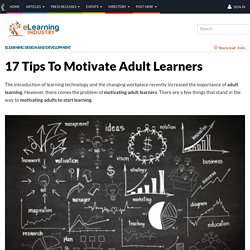
However, there comes the problem of motivating adult learners. Learning Theories/Adult Learning Theories. Overview[edit] Typical adult learning theories encompass the basic concepts of behavioral change and experience.
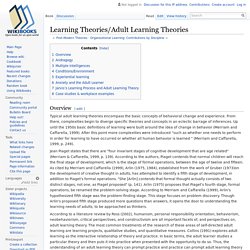
From there, complexities begin to diverge specific theories and concepts in an eclectic barrage of inferences. Up until the 1950s basic definitions of learning were built around the idea of change in behavior (Merriam and Caffarella, 1999). After this point more complexities were introduced “such as whether one needs to perform in order for learning to have occurred or whether all human behavior is learned ” (Merriam and Caffarella, 1999, p. 249). Jean Piaget states that there are "four invariant stages of cognitive development that are age related" (Merriam & Caffarella, 1999, p. 139). Teacher - 5 Principles for the Teacher of Adults. The teacher of adults has a different job from the one who teaches children.
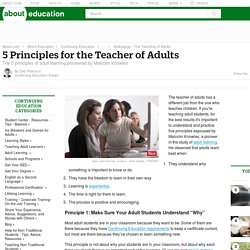
If you're teaching adult students, for the best results it's important to understand and practice five principles espoused by Malcolm Knowles, a pioneer in the study of adult learning. He observed that adults learn best when: They understand why something is important to know or do. They have the freedom to learn in their own way. Learning is experiential. Principle 1: Make Sure Your Adult Students Understand “Why” Most adult students are in your classroom because they want to be. This principle is not about why your students are in your classroom, but about why each thing you teach them is an important part of the learning.
Teaching adults. Seven Factors in Adult Learning Environments. According to the study conducted by Dorothy D.
